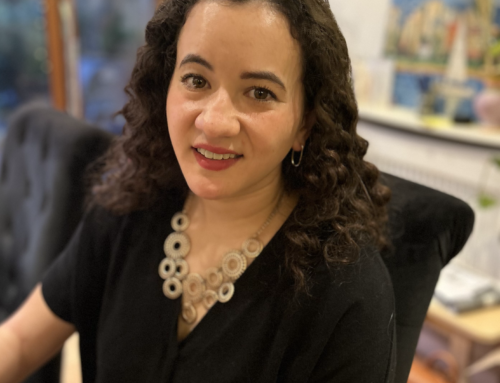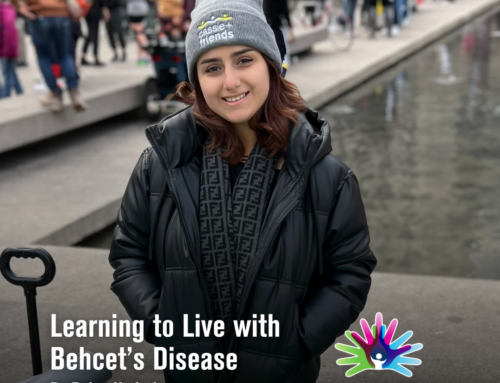
Trish is an inspiring community leader and one who has already accomplished so much in her young life. Having completed her Bachelor’s Degree in Commerce, she is now pursuing a Master’s Degree in the Netherlands, demonstrating her unwavering dedication to her education and personal growth.
Trish’s unique life experiences have given her a diverse perspective, from receiving a JA diagnosis to navigating school and friendships to life after pediatric care and now successfully immersing herself in a different country (and continent!).
Her blog post below highlights her strength and resilience, and she is excited to share her story with you at our upcoming webinar Beyond Transition: Easing into Young Adult Care with Childhood Rheumatic Disease. Register here.
According to dictionary.com a disease is a disorder of structure or function in a human, animal, or plant, especially one that produces specific signs or symptoms or that affects a specific location and is not simply a direct result of physical injury.
Ok, so reading that was a little scary.
A disease can affect anyone and every person around us.
Arthritis (*write on board*)
What is it? A disease that is very foreign to most kids our age. A disease that we hear about when we see little old ladies depicted on tv shows. A disease that is not heard about a lot.
When I was 11, this disease became my life and more. Let me tell you, being diagnosed with an autoimmune disease at 11 years old was a literal nightmare. I think I had about 5 breakdowns. I would be in pain morning to night and my doctors could not for the life of them figure out why.
Rheumatoid arthritis.
You know, for the longest time I didn’t even know what that was.
Essentially, arthritis is like a really mean monster that decides to stay dormant for as long as it can and then you do one little thing that upsets it and all of a sudden you’re facing the grinch of joint pains. I didn’t know what my body was actually facing. Then I found out, from a comic book, no less. Arthritis is literally good fighting good, like Superman fighting Batman and not working together. In our bodies there are good and bad cells, when you are diagnosed with arthritis the good cells decide they’re going to fight each other which ends up wreaking havoc on your joints. Which leads to inflammation, fever, pain and other disgusting symptoms.
In your body you have a rheumatoid factor, in normal people they have a negative rheumatoid factor that is under 20. In my body my rheumatoid factor is positive and was over 200 when I got my first blood test, even in my recent ones it has been 70 or higher.
I never thought that having arthritis would ever teach me anything, in the beginning I victimized myself a lot. Questions like, “Why did it have to be me? Will the pain ever stop? When can I be normal again?” Grace Bannon said, “That there is another side to the coin to this disease and that strengthens me to not feel sad for myself.”
My mom used to drive herself sick with worry because I had taken to hiding my pain, because it felt like an embarrassment. But through rugby, lifeguarding and swimming I learned that even though I had obstacles to overcome, that didn’t affect anyone else I knew, I could do anything just as well as anyone else. The defining moment came when my dad looked at me and told me that he was proud of the person I’d become, of the fact that no matter what happened to me I just seemed to keep going.
Over time I met teachers and heard about people that have fought arthritis, I learned that I could accomplish the impossible even carrying the extra 10 lbs on my back that is this disease. “You have to push yourself to turn this situation into a positive” is a quote I live by.

A little while ago, I read about a spoon theory. The theory is that a healthy person has unlimited spoons and can do anything they want all day. But a person with rheumatoid arthritis or any disease for that matter, doesn’t have an unlimited amount of spoons. They have to choose whether they want to walk to school or go to practice. They can’t do both because their bodies can’t handle it. It’s advised you use this with your friends so they know why you cannot always keep up. You simply say I don’t have any spoons left and that’s all. Simple. No explanation needed.
This gave me the wake up call I needed.
My disease isn’t anybody’s business but my pain isn’t worth less than any of your pain. My pain is what has changed me and helped me become who I am today. My pain may be my happiness.
Two years ago I started going to a camp. A camp for kids with arthritis. A camp where I didn’t feel left out. A camp where I met people that felt like I did. A camp where my pain wasn’t shunned or misunderstood I made lifelong friends and for once in my life I didn’t feel different from anyone around me. We were all one in the same. We all had a limited number of spoons.
We all had arthritis.










Leave A Comment